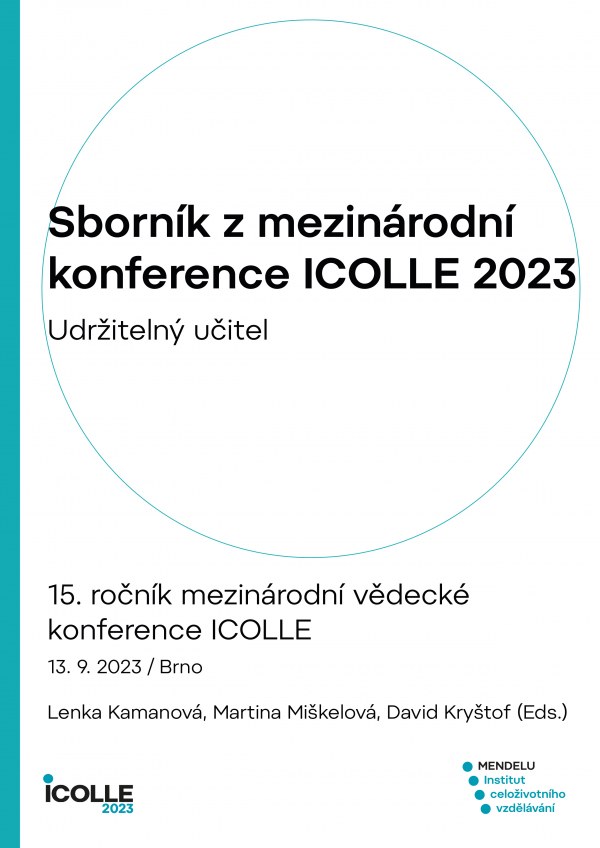
DOI: 10.11118/978-80-7509-958-7-0079
FAKTORY KVALITY VÝUKY JAKO OBTÍŽNĚ UCHOPITELNÝ PROBLÉM
- Jaroslav Lindr
Answering the question of what quality teaching is and what is should look like is not as simple as it might seem at first glance. The goal of the research is to see what benefit the teaching of subjects has for students, or which factors of the quality of teaching significantly influence the benefit. It turns out that it may not be a single key factor, but rather a combination of a number of factors of the quality of teaching, which we might not be able to detect intuitively, while scientific-methodological criteria will help to reveal it. A social science subject at a technical university in 2020–2022 was selected for the analysis. In the questionnaire, the respondents expressed their opinions on the semantic differential scale for individual teaching quality criteria, of which 62 were proposed. The choice of criteria focused not only on the factual description of the pedagogical situation, the personality of the teacher, on the well-being of the environment, but also, for example, how the students themselves reflect on the contribution of the subject, what it gives them, how it enriches them in the educational field, how they feel about the subject, how it develops their intellectual or creative abilities, etc. Two statistical methods were used for further processing, namely the principal component method and the forward step method. It turned out that among the most important criteria of the quality of teaching, the students assigned in particular when the teaching is fun for them, it is meaningful, it moves the students intellectually, they will use the knowledge in their lives and when it is beneficial for their personal development and professional career.
Keywords: social science courses, quality teaching criteria, general development, teaching benefit, quantitative research, statistical processing
pages: 79-88, online: 2023
References
- Helmke, A. (2008). Qualität im Unterricht der Sekundarstufe. Dostupné z http://www.heuber.de/sixcms/media.php/36/sympl_4_qualitaet.pdf
- Chvál, M. (2012). Kvalita výuky jako téma současnosti. Pedagogika. 2012, roč. 62, č. 3, s. 241-243.
- Maňák, J., et al (2008). Kurikulum v současné škole. Brno: Paido.
- Janík, T. (2012). Kvalita výuky: vymezení pojmu a způsobu jeho užívání. Pedagogika. 2012, roč. 62, č. 3, s. 244-261.
- Janík, T. a J. Slavík (2013). Kvalita výuky: obsahově zaměřený přístup ke zkoumání a zlepšování výuky. Brno: MU.
- Maňák, J. (2009). Vzdělávání ve společnosti vědění. In T. Janík, et al (ed.), K perspektivám školního vzdělávání (s. 11-20). Brno: Paido.
- Meyer, H. (2004). Was ist guter Unterricht? Berlin: Cornelsen Verlag Scriptor GmbH.
- Michek, S. (2009). Možné výzkumné strategie při hledání vazeb mezi autoevaluací a kolegiální evaluací škol. In V. Fuglík, Kvalita vzdělávání v reflexi pedagogických teorií a výzkumů (s. 1-11). Praha: Pierot.
- Mrňová, O. (2004). Perspektivy hodnocení kvality ve vysokoškolském vzdělávání. Pardubice: Scientific paper of the University of Pardubice. Series C. Dostupné z https://dk.upce.cz/bitstream/handle/10195/32557/CL525.pdf?sequence=1&isAllowed=y
- Pol, M. (2009). Škola v proměnách. Brno: MU.
- Pöschl, R. (2011). Postoje žáků ke škole. Praha: NUOV. Dostupné z http://www.nuov.cz/uploads/AE/evaluacni_nastroje/25_Postoje_zaku_ke_skole.pdf
- Rýdl, K. (2003). Inovace školských systémů. Praha: ISV.
- Průcha, J. (1997). Moderní pedagogika. Praha: Portál.
- Rýdl, K., et al (1998). Sebehodnocení školy. Jak hodnotit kvalitu školy. Praha: Strom.
- Zpráva IRDAC (1998). Kvalita vzdělání - odpověď na výzvy budoucnosti. Praha: ÚIV.


